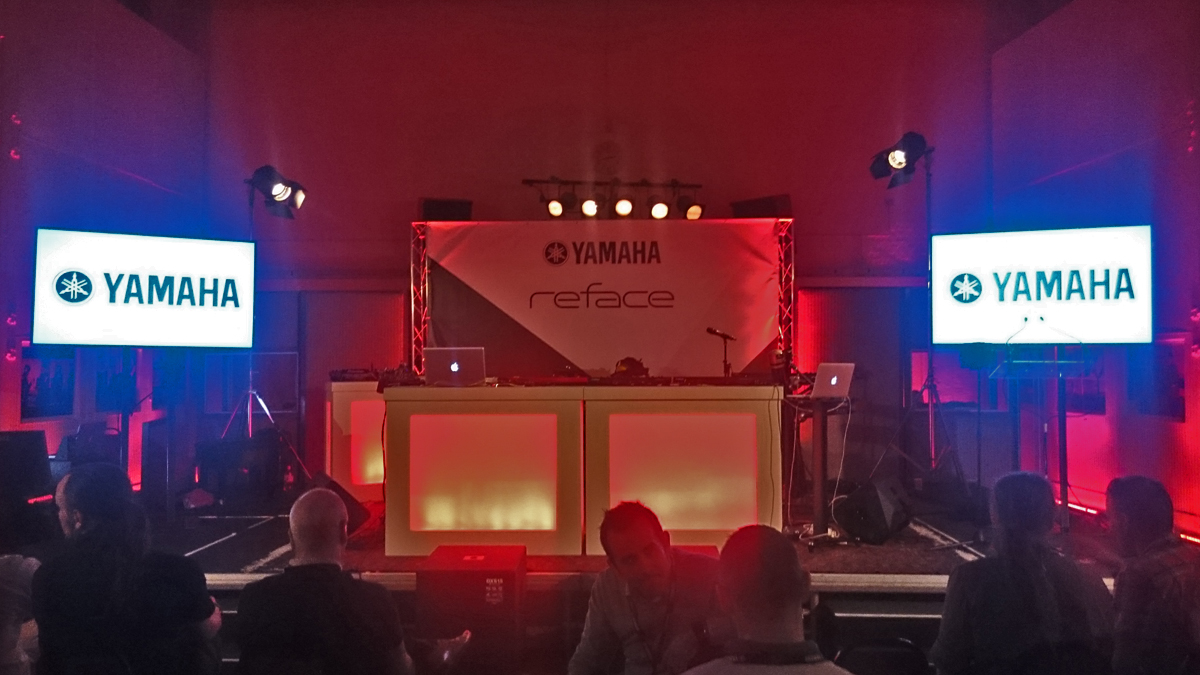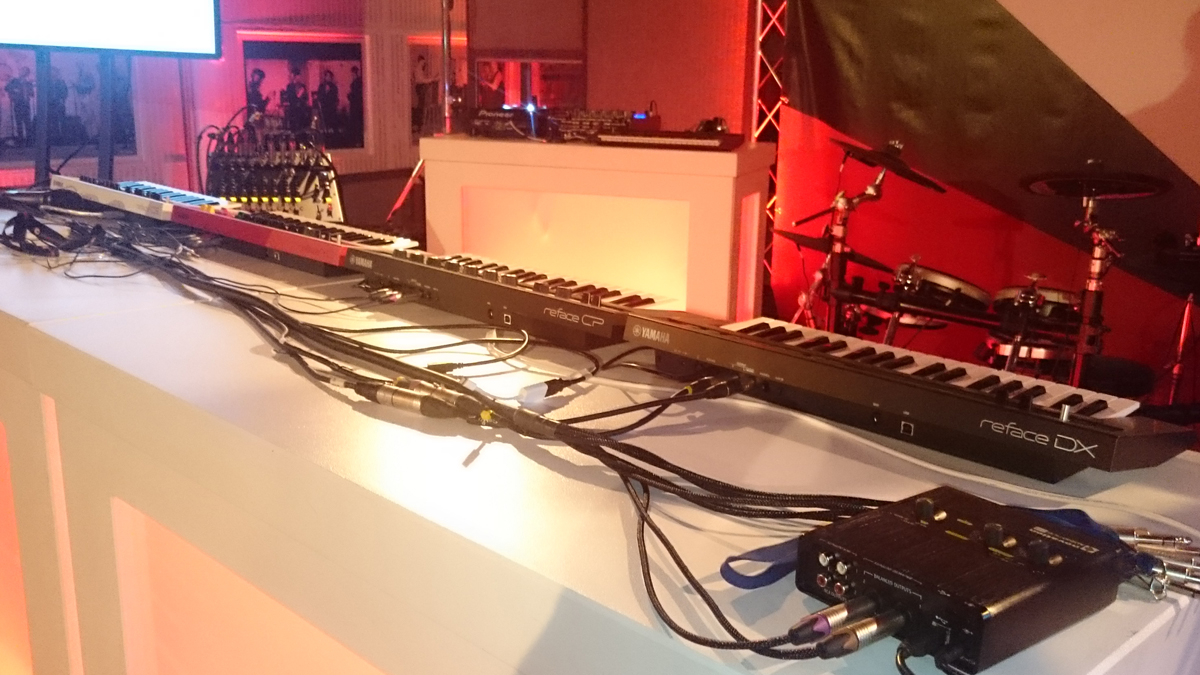Hands-on: Yamaha Reface UK launch event
We give our first impressions on Yamaha's latest portable products

Want all the hottest music and gear news, reviews, deals, features and more, direct to your inbox? Sign up here.
You are now subscribed
Your newsletter sign-up was successful
With the release of Yamaha's first teaser video for Reface, it looked like Yamaha had finally joined the reissued classics party. Lately, both Korg and Roland have both given us what we wanted and more; cheap analogue gear, faithful reimaginings of old classics and some entirely new products. Could it be that Yamaha is about to do the same?
We were invited to see for ourselves at the official Yamaha Reface UK launch party at Abbey Road Studios. And what better place to launch four new products steeped in 40 years of instrument-making history, than the famous Studio Two? Sitting alongside pianos and organs played on by such greats as John Lennon were the diminutive fab-four: the Reface CS, DX, YC and CP.

After a couple of hours of presentations and performances, we were able to get our hands on the products for the first time. Since the launch, much has been said with regard to their mini-keys. There are few fans of the diminutive key style, and at first glance they fill us with dread, too. However, even with the sound off, these do feel different to your average mini-sized offering.
The action is reminiscent of Korg's 3/4 key size found on the MS-20 mini and RK100S - it's light with plenty of travel. Quite a departure from the unplayable springy action most of us have had the misfortune of playing in lesser products.
Although each instrument is sonically different, they all benefit from a wide dynamic range, and this really enhances the playing experience. The sounds respond very well to changes in velocity, with the CP being the best example. It really invites you to hammer the keys and you are rewarded with satisfying feedback, especially when engaging the wah with some distortion dialled in.
"Tweaking and manipulation of the DX's parameters via the four touch-sliders is intuitive and very easy, making this a more accessible instrument than FM8."
The playability doesn't end there. Each interface has been designed with a nod to its heritage and for swift sound manipulation. Faders adorn the CS (although we were hoping for some of those colourful original CS switches); classic combo-organ switches and faders-for-drawbars work well on the YC; the DX has been fitted with four touch sliders that can be tapped for incremental adjustment and swiped when cycling through larger amounts of parameter data; and the CP is decked out with retro-style knobs and switches.
The controls across all four instruments feel solid and not too cheap. In fact, the same could be said for the build-quality as a whole. Yes, the Refaces are plastic, but they don't feel hollow and toy-like. The construction is reassuringly solid, but lightweight (as you would expect from a portable instrument).
Want all the hottest music and gear news, reviews, deals, features and more, direct to your inbox? Sign up here.
Despite the small footprint, Yamaha has managed to cram a lot of control into each instrument, with some very neat little touches. The CS's Texture and Mod functions adapt differently depending on the oscillator chosen. For instance, with the Multi-saw the Texture fader adds a sub-oscillator and the Mod layers multiple sawtooth waves. Whereas with the FM oscillator, Texture sets the modulation amount and Mod changes the pitch of the modulator.
"The Reface CP invites you to hammer the keys"
There was one slight disappointment with the CS, though. We noticed a delay when selecting between waveforms. The latency, coupled with an undesirable pop, sounded like the oscillators were spluttering into life with each selection - during performance this could be a big problem for many. The other three instruments didn't suffer the same issue when selecting voices, so it's very much fingers crossed that this is a pre-production model and a one-off.
As for the most important feature - the sound - all four perform admirably. The CS has a lot of balls and the low-end is wonderfully rich - the results are very impressive for a virtual analogue engine.

The attention to detail on the YC is apparent with its scratchy distorted tones coming courtesy of the distortion and Leslie rotary speaker effects. The same goes for the CP with its distortion and wah, with the addition of a digital and analogue-style delay a real bonus.
The DX, as you'd expect, churns out luscious pads and punchy chiming leads of all metallic varieties. Although having just four operators left us feeling a little disappointed.
There are many asking for comparisons between the DX and Native Instruments' FM8. They might share the same heritage, but what we have here are two very different FM synthesizers.
Plenty of people will have invested a lot of time exploring the depth and advanced functions that FM8 has to offer, but Reface DX is at the other end of the scale. Perhaps the four-operator setup is designed to keep things simple? Tweaking and manipulation of the parameters via the four touch-sliders is intuitive and very easy, making this a more accessible instrument than FM8.
Face off
At this stage it's impossible to pick a favourite Reface. Going into the launch we were mostly looking forward to playing the DX and CS models, but the CP and YC are immensely playable and surprised us the most with their overall authenticity.
The Reface's keybeds are indeed impressive. In each case, you almost forget you're playing a small battery-powered instrument. Although the less dexterous and chunky-fingered players among us may still struggle with that key size.
MusicRadar is the internet's most popular website for music-makers of all kinds, be they guitarists, drummers, keyboard players, DJs or producers.
GEAR: We help musicians find the best gear with top-ranking gear round-ups and high-quality, authoritative reviews by a wide team of highly experienced experts.
TIPS: We also provide tuition, from bite-sized tips to advanced work-outs and guidance from recognised musicians and stars.
STARS: We talk to artists and musicians about their creative processes, digging deep into the nuts and bolts of their gear and technique. We give fans an insight into the actual craft of music-making that no other music website can.
